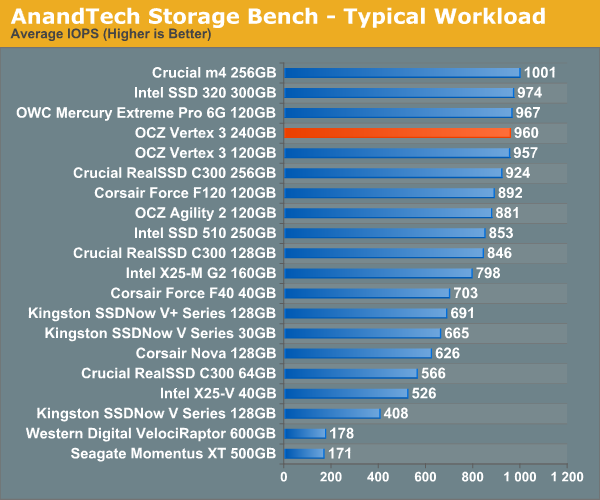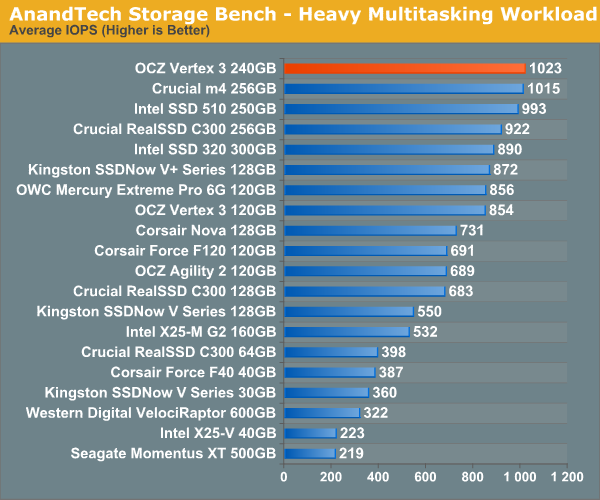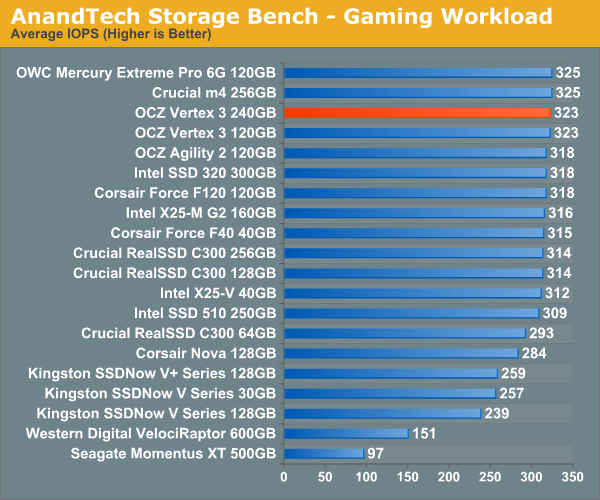OCZ Vertex 3 (240GB) Review
by Anand Lal Shimpi on May 6, 2011 1:50 AM ESTAnandTech Storage Bench 2010
To keep things consistent we've also included our older Storage Bench. Note that the old storage test system doesn't have a SATA 6Gbps controller, so we only have one result for the 6Gbps drives.
The first in our benchmark suite is a light/typical usage case. The Windows 7 system is loaded with Firefox, Office 2007 and Adobe Reader among other applications. With Firefox we browse web pages like Facebook, AnandTech, Digg and other sites. Outlook is also running and we use it to check emails, create and send a message with a PDF attachment. Adobe Reader is used to view some PDFs. Excel 2007 is used to create a spreadsheet, graphs and save the document. The same goes for Word 2007. We open and step through a presentation in PowerPoint 2007 received as an email attachment before saving it to the desktop. Finally we watch a bit of a Firefly episode in Windows Media Player 11.
There’s some level of multitasking going on here but it’s not unreasonable by any means. Generally the application tasks proceed linearly, with the exception of things like web browsing which may happen in between one of the other tasks.
The recording is played back on all of our drives here today. Remember that we’re isolating disk performance, all we’re doing is playing back every single disk access that happened in that ~5 minute period of usage. The light workload is composed of 37,501 reads and 20,268 writes. Over 30% of the IOs are 4KB, 11% are 16KB, 22% are 32KB and approximately 13% are 64KB in size. Less than 30% of the operations are absolutely sequential in nature. Average queue depth is 6.09 IOs.
The performance results are reported in average I/O Operations per Second (IOPS):

If there’s a light usage case there’s bound to be a heavy one. In this test we have Microsoft Security Essentials running in the background with real time virus scanning enabled. We also perform a quick scan in the middle of the test. Firefox, Outlook, Excel, Word and Powerpoint are all used the same as they were in the light test. We add Photoshop CS4 to the mix, opening a bunch of 12MP images, editing them, then saving them as highly compressed JPGs for web publishing. Windows 7’s picture viewer is used to view a bunch of pictures on the hard drive. We use 7-zip to create and extract .7z archives. Downloading is also prominently featured in our heavy test; we download large files from the Internet during portions of the benchmark, as well as use uTorrent to grab a couple of torrents. Some of the applications in use are installed during the benchmark, Windows updates are also installed. Towards the end of the test we launch World of Warcraft, play for a few minutes, then delete the folder. This test also takes into account all of the disk accesses that happen while the OS is booting.
The benchmark is 22 minutes long and it consists of 128,895 read operations and 72,411 write operations. Roughly 44% of all IOs were sequential. Approximately 30% of all accesses were 4KB in size, 12% were 16KB in size, 14% were 32KB and 20% were 64KB. Average queue depth was 3.59.

The gaming workload is made up of 75,206 read operations and only 4,592 write operations. Only 20% of the accesses are 4KB in size, nearly 40% are 64KB and 20% are 32KB. A whopping 69% of the IOs are sequential, meaning this is predominantly a sequential read benchmark. The average queue depth is 7.76 IOs.











90 Comments
View All Comments
fowldogs - Friday, May 6, 2011 - link
Anand,I have recently researched which SSD to purchase and from several reviews, your's as well as many others, the OCZ Vertex 2 or 3 seemed like the best choice for performance. However, as I read consumer reviews on different shopping sight (Newegg, Amazon, etc), the Vertex 2 and 3 drives received numerous low reviews; including many that said the drive died on them soon after purchase.
Can you shed any light on this? Have you had any discussions with OCZ about their quality? I know that Mac's can be very finicky about SSD drives, but it seems many PC users were encountering problems too.
For now, I have decided on a Crucial drive, but I would like to know more about the quality issues of OCZ.
Omid.M - Friday, May 6, 2011 - link
If it's a ribbon cable issue for the 6 Gbps interface, then it would make the most sense to get the Intel 320 series SSD. Take a look on MacRumors about this drive versus Vertex 3 in the MBP, especially the 2011 models.Many more people are having good luck with Intel 320 than with Vertex 3. Sad.
Maybe someone should tweet and email OCZ about it, given how closely they seemed to be working with AnandTech to address reliability issues?
@moids
dagamer34 - Friday, May 6, 2011 - link
Always follow the law of reviews: no one actively thinks to leave a positive review, people always glamor for attention with negative reviews.darwinosx - Friday, May 6, 2011 - link
Yes but there is a critical mass of people with issues and much commonality among their complaints so that doesn't really work here.seapeople - Saturday, May 7, 2011 - link
Yes, but when Intel drives get 3% of 1-star ratings and the Vertex 2 gets 20% of 1-star ratings with numerous people claiming multiple RMA's, it makes you think there's a significant difference in reliability.Anand Lal Shimpi - Friday, May 6, 2011 - link
Perhaps a little background is in order :)Whenever I hear about a failure of any component from one of our readers (either via a comment, email, twitter, etc...), I forward it on to the manufacturer of the product. Usually this results in two things: 1) the AT reader getting taken care of a little quicker than normal, and 2) the manufacturer getting the faulty product back sooner so they can figure out what went wrong. I do this with all products but SSDs are the most common given the large amount of growing pains we've had there as an industry.
For a while there I was spending a lot of time talking to OCZ about failed Vertex 2s. Unfortunately I was traveling a lot at the start of it and didn't have time to pursue in great depth, but I alerted OCZ that there seemed to be a growing trend and asked for an explanation. Meanwhile I believe OCZ also saw the same trend, determined a root cause and addressed it.
OCZ has the problem of being a relatively small company competing amongst much larger ones in the SSD space. As a result there's pressure to scale production but it's near impossible to quickly scale without missing something and it seems like quality has suffered at distinct points in its history. Each time OCZ usually makes good by its customers, but it's still a risk associated with buying from a smaller company vs. an Intel for example. I do believe the trend is generally positive, I do expect the Vertex 3 to be more reliable and consistent than anything in OCZ's past - but for utmost reliability, Intel seems to have the best return rates in the industry for SSDs.
I have been meaning to check out OCZ's new manufacturing facilities which may give me some more insight into its investment in production and testing. I know on the validation side OCZ is leaps and bounds better than it was 2 years ago (I spent a lot of time discussing validation with OCZ back in the Vertex 1, Vertex 2 and Core days) but I'm not sure where they stand in terms of production.
The Mac problems I believe are separate. There's a problem with some (not all) MBPs and some SSDs but I can't figure out what. OWC seems to think that the problems on the 17-inch 2011 MBPs are related to EMI and Apple's quirky SATA cable - I suspect this may extend to all of the models, I honestly just haven't had the time to test it.
Take care,
Anand
darwinosx - Friday, May 6, 2011 - link
OWC is the one that made the false claims about OCZ ram specs (which you debunked) and they also sell a replacement cable. So I don't take anything they say very seriously. Weren't you the one who said manufacturers should ship to get things out even if they weren't quite ready? A post I strongly disagree with and is likely the cause of OCZ's troubles.cactusdog - Friday, May 6, 2011 - link
Its really a shame you get a big performance hit with the 120GB version. Its easy to see how the marketing works.....first release the fast 240Gb version, once the reviews are up, release the slower mainstream 120GB version and hope no one looks at the fine print.thornburg - Friday, May 6, 2011 - link
I realize that you're a big believer in the SandForce drives, but where are the reviews of other products?Is Intel the only one able to get any coverage?
Where are the reviews of the new Samsung SSDs?
NCM - Friday, May 6, 2011 - link
Somebody is sure in love with their 4-die NAND packages! Enough that the 480GB drive costs well over triple the price of the 240GB version, even though virtually everything but the NAND should be the same. I could see a 480GB SSD for a grand, but $1800? (Or a 320GB for $750.) That's silly money, and a self-fullfilling prophecy to boot: they don't sell because they're so expensive because there's no production volume.Anand, to repeat somebody else's request in one of your previous SSD reviews, could you please include a typical 5400 rpm laptop drive in your power consumption comparisons? (The Seagate Momentus XT 500 hybrid doesn't really count as typical.)